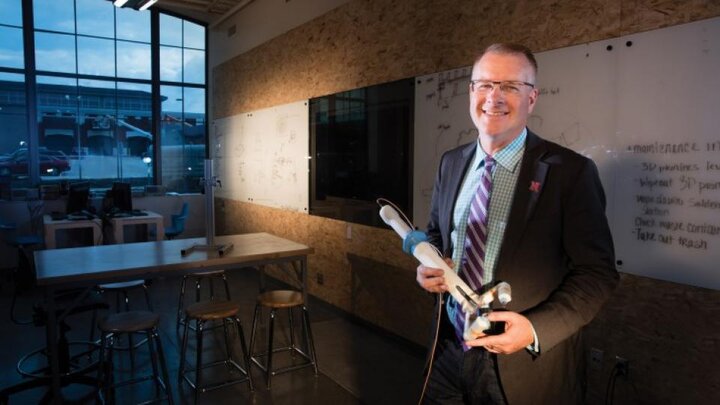'Making for Innovation' is focus of Nebraska Lecture

From developing tiny surgical robots to launching the Nebraska Innovation Studio, fearless experimentation has defined University of Nebraska-Lincoln engineer Shane Farritor's career. In the fall Nebraska Lecture on Oct. 27, Farritor will discuss how creativity and risk-taking are essential to innovation.
The free public lecture, "Making for Innovation," is 1:30 p.m. at the Nebraska Innovation Campus Conference Center, 2021 Transformation Drive. A reception and tours of Innovation Studio will follow. A live webcast will be available with an archived video available within a week of the event.
Farritor's lecture will address the importance of hands-on making and how it leads to more creativity and better solutions to problems. He also will share practical tips on cultivating an innovative work environment.
"Innovation is key to America's future. It's our competitive advantage," said Farritor, the Lederer Professor of Engineering. "We have to do this if we want to move ahead, and that will take special effort and focus."
Effective collaboration across disciplines is a hallmark of Farritor's research. In his lecture, he will share how he's applied his robotics expertise to medicine, transportation, agriculture and more.
His latest venture is overseeing the Innovation Studio, also known as UNL's Maker Space, at Nebraska Innovation Campus. The space includes an art studio, woodworking and machine shops, and other amenities for faculty, staff and community members whom Farritor describes as "intrinsically motivated to create." He also is adviser to UNL's Maker's Club, which has more than 700 members.
"All these activities have a common theme of innovation, which requires a different process of thinking about problems," he said.
Farritor joined the UNL faculty in 1998. He holds doctoral and master's degrees from the Massachusetts Institute of Technology and a bachelor's degree from UNL. In 2014, he received an Innovation, Development and Engagement Award, a top University of Nebraska honor for faculty who extend their academic expertise to enrich the broader community.
His lecture is part of The Nebraska Lectures: Chancellor's Distinguished Lecture Series, sponsored by the UNL Research Council, Office of the Chancellor and Office of Research and Economic Development in partnership with the Osher Lifelong Learning Institute.
Written by: Ashley Washburn | Research and Economic Development